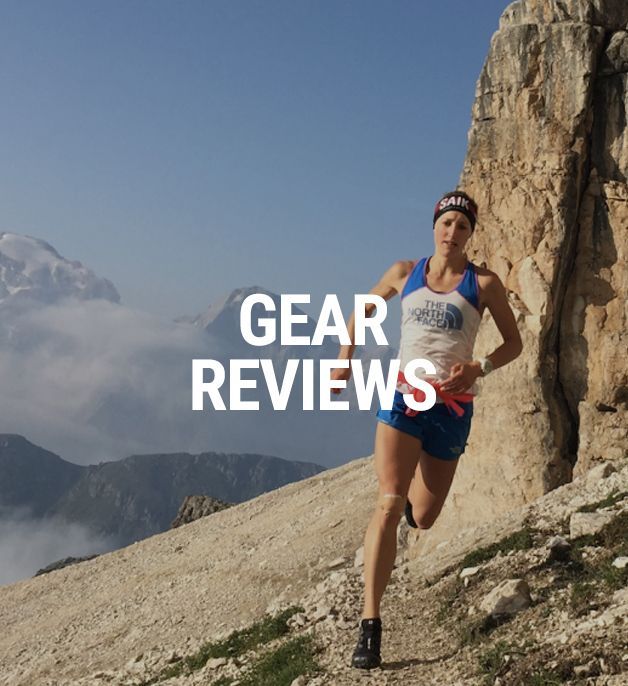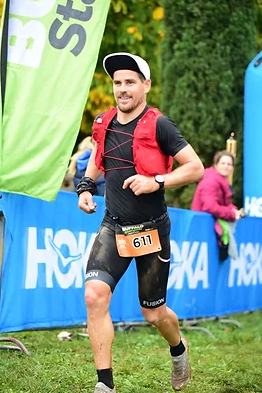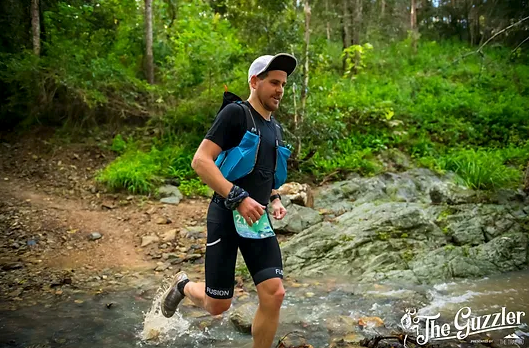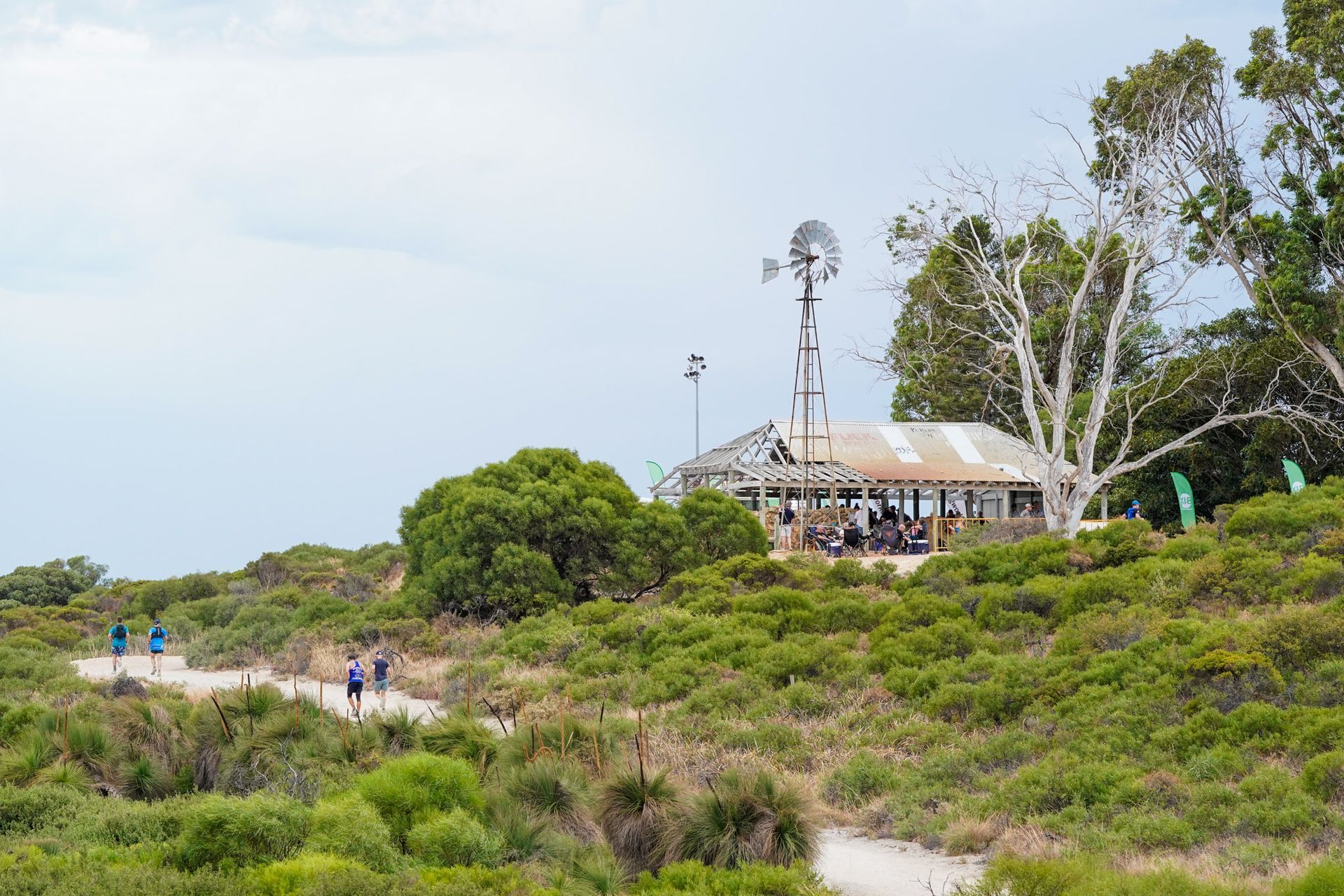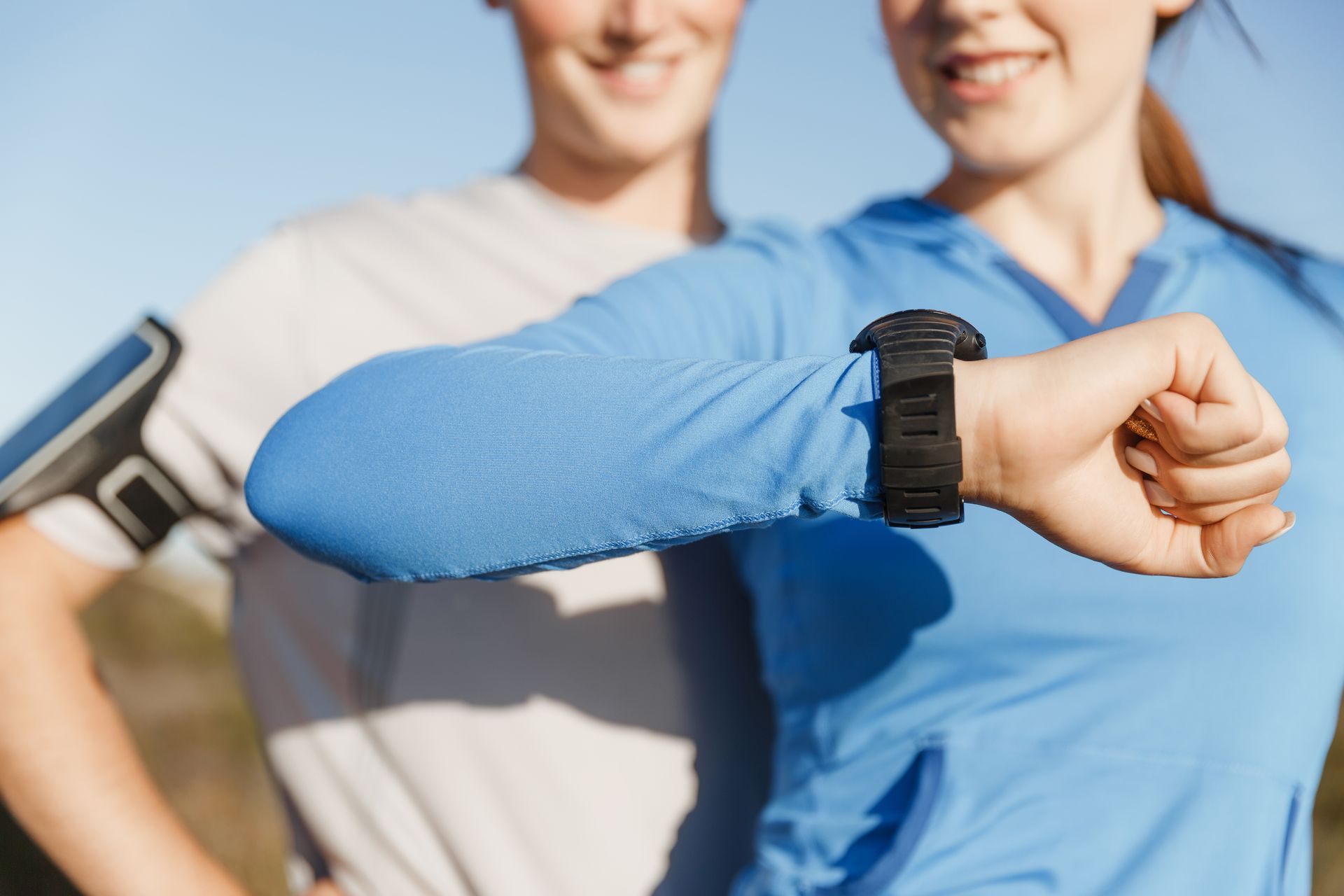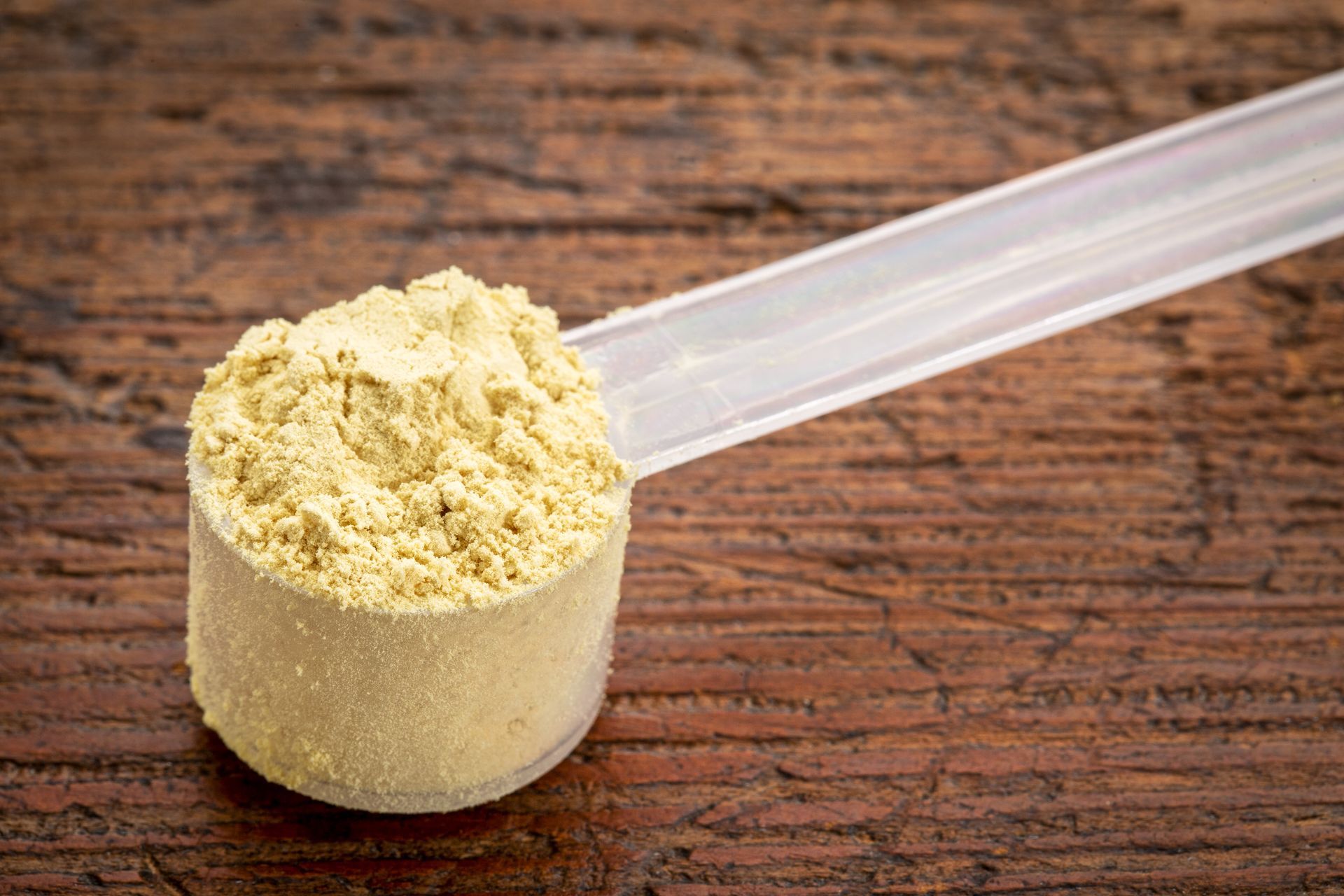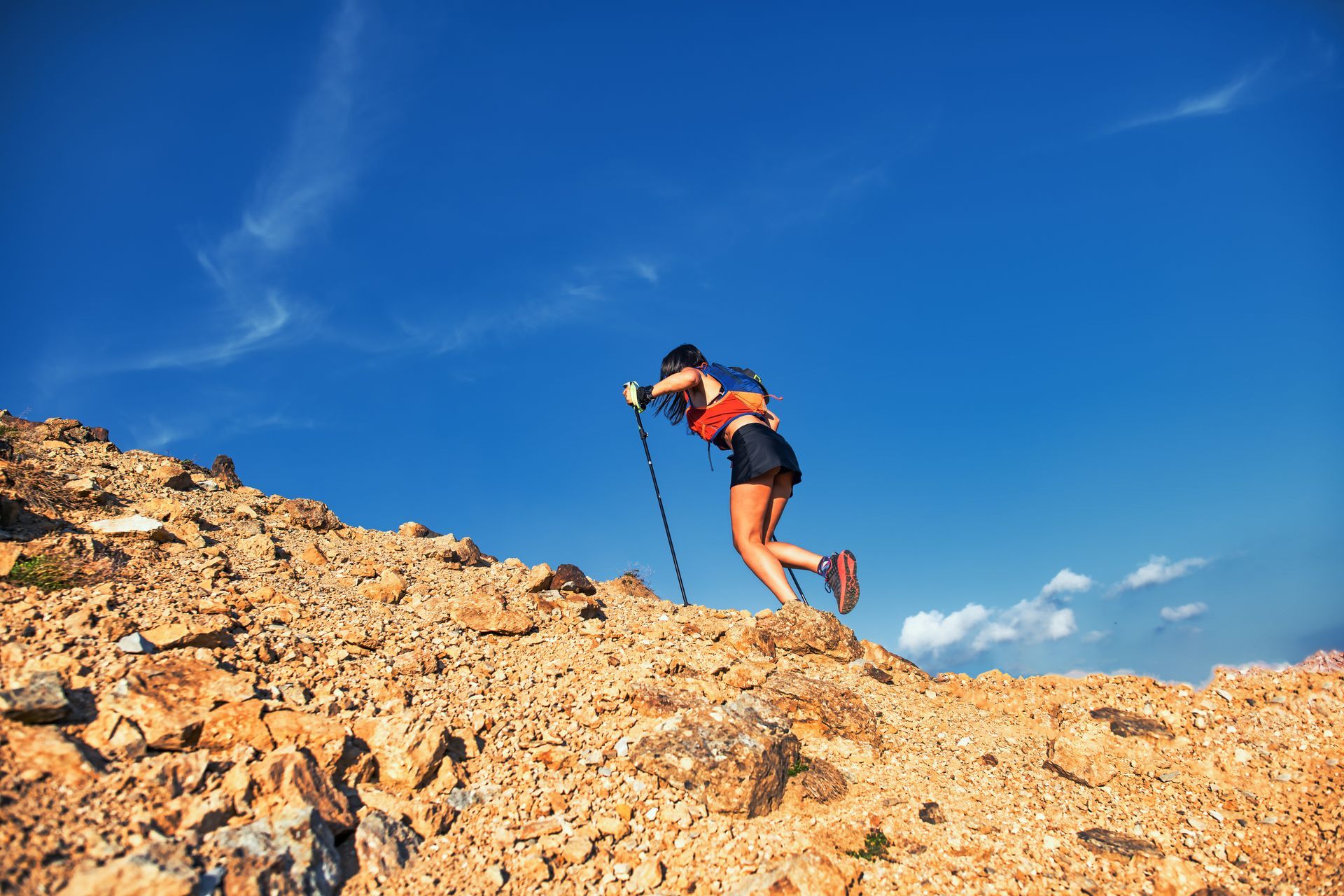
COACH’S CORNER - Running Hills In Training by Benn Coubrough
learn how to use hill training the right way to get the most out of your race prep

Trail running, with its diverse terrain and breathtaking landscapes, captivates runners seeking adventure and challenge. Amidst the rugged trails and undulating paths, one element stands tall as both a formidable foe and a steadfast ally: hills. While the sight of an incline may evoke a mix of trepidation and determination, embracing hill training is paramount for trail runners aiming to unlock their full potential and conquer the trails with confidence.
In this article, we delve into the multifaceted benefits of running hills for trail runners. Beyond the physical exertion and the allure of amazing views from atop summits, hill training offers a wealth of advantages that extend to both body and mind. From building strength and cardiovascular endurance to honing technique and fostering mental resilience, the ascent of each hill presents an opportunity for growth and empowerment.
Drawing from insights into training on hills,, we explore how hill training enhances trail runners' performance, mitigates injury risks, and enriches their overall running experience. Benefits that will support physiological adaptations, biomechanical nuances, and psychological strategies involved in tackling hills, aiming to equip trail runners with knowledge and tools to embrace the challenges of elevation gain and leverage it to their advantage.
With the aim to inspire trail runners of all levels to embrace hills not as obstacles to be overcome, but as gateways to excellence and exploration. Whether navigating rocky trails, scaling mountain peaks, or traversing rolling hillsides, hill training serves as a tool for trail running preparation, empowering runners to conquer the trails with strength, resilience, and unwavering determination.
Running hills offers several benefits for runners, both in terms of physical fitness and overall performance. Here are some of the key advantages:
STRENGTHENS MUSCLES: Running uphill engages various muscle groups, including the quadriceps, hamstrings, calves, glutes, and hip flexors. This helps build strength in these muscles, contributing to overall lower body strength.
IMPROVES CARDIOVASCULAR ENDURANCE: Hill running increases the intensity of your workout, forcing your cardiovascular system to work harder. This can enhance your cardiovascular endurance over time, improving your ability to sustain longer and more challenging runs.
ENHANCES RUNNING ECONOMY: Running uphill requires more effort and energy compared to running on flat terrain. As a result, hill training can improve your running economy, making your stride more efficient and helping you use oxygen more effectively.
BOOSTS POWER AND SPEED: Uphill running demands a powerful and explosive stride. This type of training can help improve your leg power and speed, which can translate to faster times on flat surfaces.
PREVENTS MONOTONY AND IMPROVES MENTAL TOUGHNESS: Adding variety to your training routine can help prevent boredom and keep you mentally engaged. Hill running also builds mental toughness as it requires perseverance and determination, especially when faced with steep inclines.
REDUCES IMPACT ON JOINTS: Running uphill typically involves a shorter stride length and slower pace, which can reduce the impact on your joints compared to high-speed, flat-surface running. This can be beneficial for those with joint issues or those looking to minimize the risk of injury.
BURNS MORE CALORIES: Running uphill increases the intensity of your workout, leading to a higher calorie burn compared to running on a flat surface. This can be advantageous for those looking to manage their weight or improve their overall fitness level.
SPECIFICITY FOR RACE PREPARATION: If your goal is to participate in a race with hilly terrain, incorporating hill running into your training is essential. It helps your body adapt to the demands of uphill running and prepares you for the specific challenges you may face during the race.
When incorporating hill running into your training regimen, it's essential to start gradually, allowing your body to adapt to the increased intensity. Begin with gentle slopes and progressively work towards steeper inclines as your strength and endurance improve.
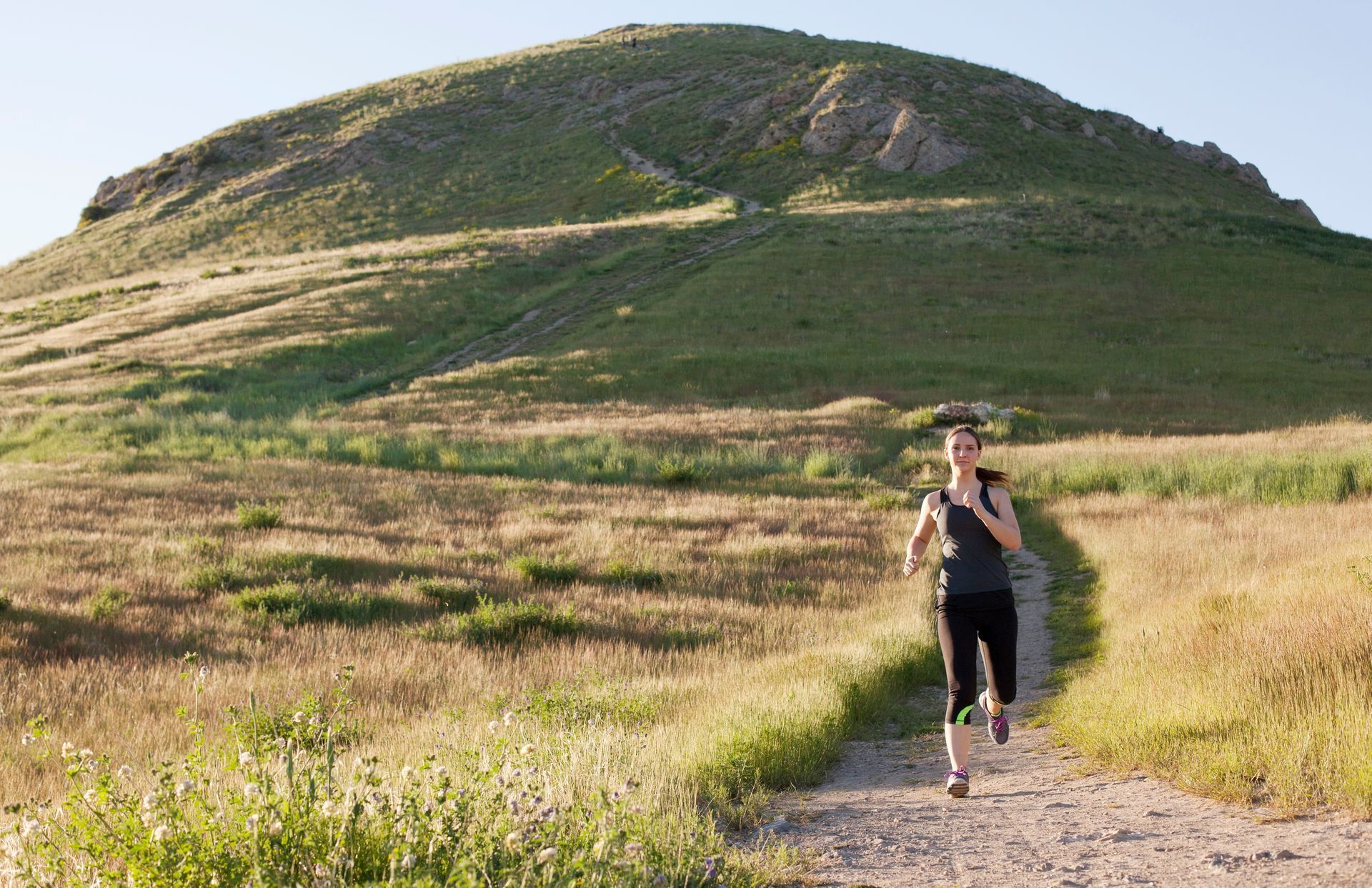
HOW TO DEVELOP YOUR HILL RUNNING ABILITY
To develop hill running ability, runners can follow a structured training plan that gradually increases the intensity and duration of hill workouts. Here are some tips and strategies to help runners improve their hill running skills:
Start Gradually:
- If you're new to hill running, start with gentle slopes and gradually progress to steeper inclines as your strength and endurance improve.
- Begin by incorporating hills into one or two of your weekly runs.
Warm-Up Properly:
- Perform a thorough warm-up before tackling hill workouts to prepare your muscles and joints for the increased intensity.
- Include dynamic stretches and light jogging to increase blood flow and flexibility.
Choose the Right Hills:
- Select hills that match your current fitness level. Gradually increase the steepness and length of the hills as you become more comfortable.
- Find a variety of hills, including short and steep, long and gradual, to target different aspects of your hill running ability.
Interval Training:
- Incorporate hill intervals into your training. Sprint up the hill for a set duration or distance, then recover with an easy jog or walk downhill.
- Example: Start with 30-second hill sprints and 2 minutes of recovery, then progress to longer sprints as you become stronger.
Focus on Form:
- Maintain good running form while going uphill. Keep your posture upright, lean slightly forward, and use your arms to help propel you forward.
- Take shorter, quicker steps to maintain efficiency and reduce the impact on your joints.
Include Hill Repeats:
- Implement hill repeats into your training routine. Choose a hill with a moderate incline and run up at a hard effort for a specific number of repetitions.
- Gradually increase the number of repeats over time.
Downhill Running:
- Don't neglect downhill running. It can improve your leg turnover and help you become more confident on descents.
- Practice controlled descents to avoid excessive impact on your joints.
Hill Workouts in Different Phases:
- Incorporate hill workouts into different phases of your training, including base building, speed training, and race-specific preparation.
- Adjust the focus of the workout based on your training goals and upcoming races.
Consistency is Key:
- Consistency is crucial for improvement. Include hill workouts in your training plan regularly, but be mindful not to overdo it to prevent injury.
- Listen to your body and adjust the intensity and frequency based on your fitness level and recovery.
Recovery and Adaptation:
- Allow adequate time for recovery between hill workouts. Your muscles need time to adapt to the increased demands.
- Consider including rest days or easy runs in between more challenging hill sessions.
Remember that progression should be gradual to avoid overtraining and reduce the risk of injury. If you're unsure about how to incorporate hill running into your training, consider consulting with a running coach or a fitness professional for personalised guidance.
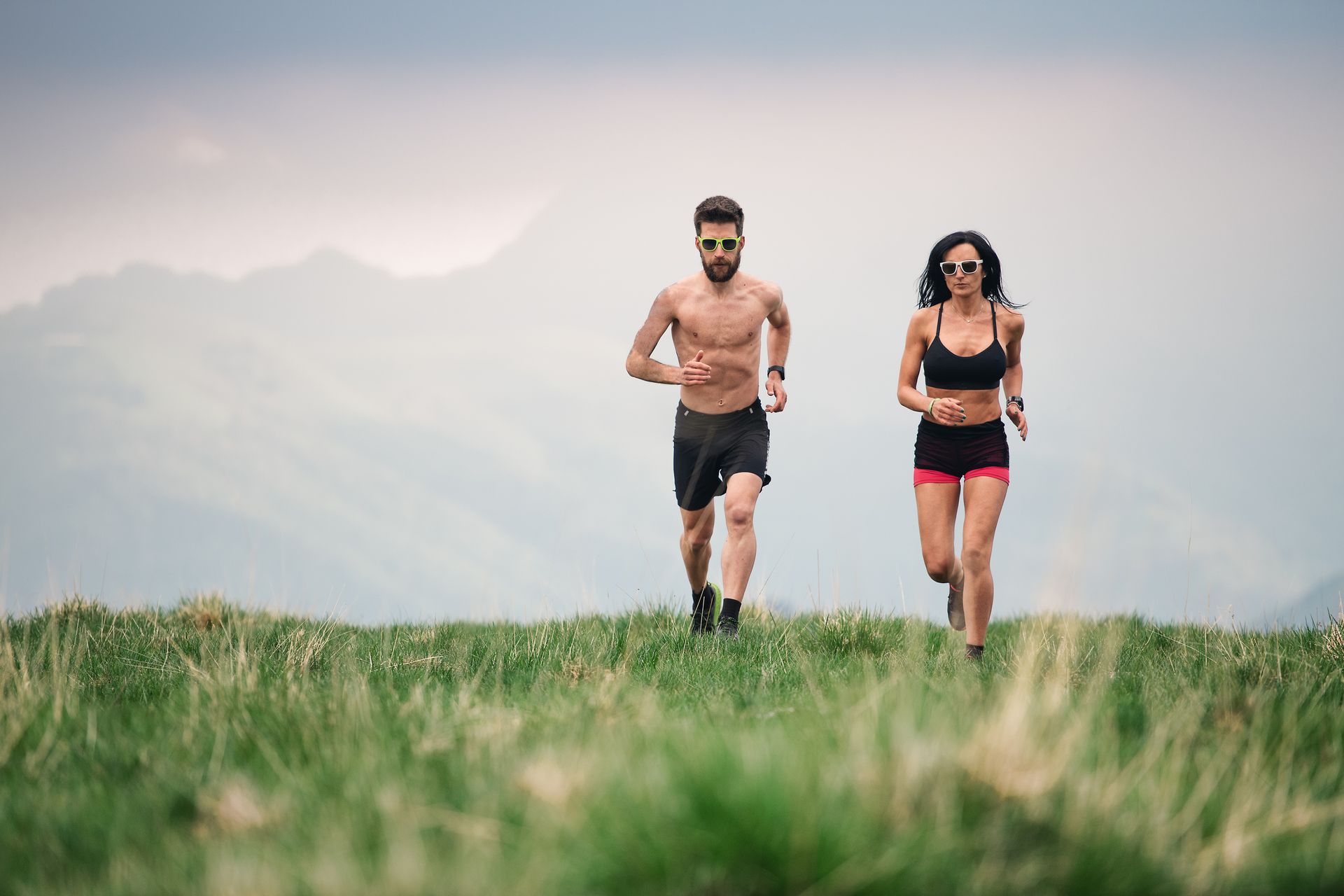
DIFFERENT TYPES OF HILL TRAINING
There are various types of hill sessions that runners can incorporate into their training to target different aspects of their fitness, including strength, speed, and endurance. Here are some different types of hill workouts:
Hill Sprints:
- Short, intense sprints up a steep hill.
- Focus on explosive power and speed.
- Perform a set number of sprints (e.g., 8-10 seconds) with full recovery between each.
Long Hill Repeats:
- Run up a longer, gradual hill at a challenging but sustainable effort.
- Aim for durations of 1-3 minutes.
- Perform a set number of repeats with a jog or walk downhill for recovery.
Short Hill Repeats:
- Sprint up a short, steep hill for a high-intensity effort.
- Typically lasts for 20-45 seconds.
- Allow for full recovery between repeats.
Hill Intervals:
- Combine short and long hill repeats in a single workout.
- Example: Alternate between 30-second sprints and 2-minute sustained efforts.
Progressive Hills:
- Start with a moderate incline and gradually increase the steepness with each repeat.
- Focuses on building strength and endurance.
- Adjust the duration and intensity based on your fitness level.
Downhill Repeats:
- Run downhill with controlled speed, focusing on quick turnover and maintaining good form.
- Improves downhill running skills and helps build leg strength.
- Perform a set number of downhill repeats with uphill recovery or flat sections.
Hill Pyramids:
- Combine varying durations of hill repeats in a pyramid structure (e.g., 30 seconds, 1 minute, 2 minutes, 1 minute, 30 seconds).
- Gradually increase and then decrease the intensity.
- Include recovery between each repeat.
Stair Running:
- Utilise stairs or a steep set of steps for a different type of incline workout.
- Run up the stairs quickly and walk or jog down for recovery.
- Focuses on leg power and cardiovascular fitness.
Terrain Changes:
- Incorporate hills into a longer run, varying the terrain between flat, uphill, and downhill sections.
- Helps simulate the challenges of a racecourse with varied elevation.
Race Simulation:
- Mimic the elevation profile of your goal race by incorporating hill repeats that match the racecourse.
- Helps prepare your body for the specific demands of the race.
When incorporating hill sessions, it's important to tailor the workouts to your current fitness level and training goals. Start with shorter and less intense sessions, gradually progressing as your strength and endurance improve. Additionally, pay attention to your form and ensure you allow adequate recovery between hill workouts to prevent overtraining and reduce the risk of injury.

EXAMPLE SESSION FOR HILL TRAINING
Kenyan Hills training:
- Steep Inclines: The hills chosen for this type of training are often steeper than what is typically used in hill workouts. The increased gradient requires runners to engage different muscle groups and develop greater strength and power.
- Short Repeats: Kenyan Hills workouts often involve short, intense hill repeats. Runners sprint up the hill for a relatively brief duration, such as 30 seconds to 2 minutes, before recovering on the way down.
- Explosive Power: The emphasis is on developing explosive power and speed, reflecting the fast-paced racing style of many Kenyan runners.
- Frequent Sessions: Kenyan runners incorporate hill training into their routines regularly, often several times per week. This consistent exposure to challenging terrain helps build strength, endurance, and mental toughness.
- Natural Terrain: The terrain chosen for Kenyan Hills workouts is typically natural and uneven, mimicking the conditions of cross-country courses or challenging racecourses.
It's worth noting that while emulating Kenyan training methods, it's crucial for individual runners to adapt workouts to their own fitness levels and goals.
Kenyan Hills can be an effective way to build strength, power, and speed, but they should be incorporated into a well-rounded training program that includes a variety of workouts to address different aspects of running performance.
Before starting any new training program, it's advisable to consult with a running coach or fitness professional to ensure that the intensity and frequency are appropriate for your individual needs and fitness level.
WHAT IS THE PERFECT GRADIENT FOR TRAINING ON HILLS
The ideal gradient for hill repeats can vary based on individual fitness levels, training goals, and the specific benefits you want to derive from the workout. However, a common guideline is to choose a hill with a gradient of approximately 5-10%. Here's a breakdown of how different gradients can affect your training:
Moderate Gradient (5-7%):
- Suitable for longer hill repeats, promoting endurance and strength.
- Requires sustained effort but allows for a faster pace compared to steeper hills.
- Good for building a foundation of hill running fitness.
Steeper Gradient (8-10% and above):
- Ideal for shorter, more intense hill sprints or repeats.
- Places greater emphasis on explosive power and sprinting capabilities.
- Engages muscles more intensely and improves anaerobic fitness.
- Can be more challenging, so shorter durations (e.g., 30 seconds to 2 minutes) may be appropriate.
Additional Tips
It's essential to consider your overall training plan and adjust the gradient and duration of your hill repeats accordingly. Here are some additional tips:
- Progress Gradually: If you're new to hill training, start with a moderate gradient and shorter repeats. As your fitness improves, gradually increase the steepness and duration of the hills.
- Mix It Up: Incorporate a variety of gradients in your training to target different aspects of your fitness. Include both moderate and steeper hills in your workout routine.
- Listen to Your Body: Pay attention to how your body responds to different gradients. If you're feeling fatigued or notice signs of overtraining, consider adjusting the intensity or taking more recovery between repeats.
- Consider Race Conditions: If you're training for a race with specific hill profiles, try to mimic those conditions in your hill repeat workouts.
- Recovery Between Repeats: Ensure you have adequate recovery between hill repeats. This allows your muscles to recover and helps prevent overuse injuries.
Ultimately, there is no one-size-fits-all answer, and individual preferences and capabilities vary. It's a good idea to experiment with different gradients and durations to find what works best for you. If possible, consult with a running coach or fitness professional to tailor your hill training to your specific needs and goals.


